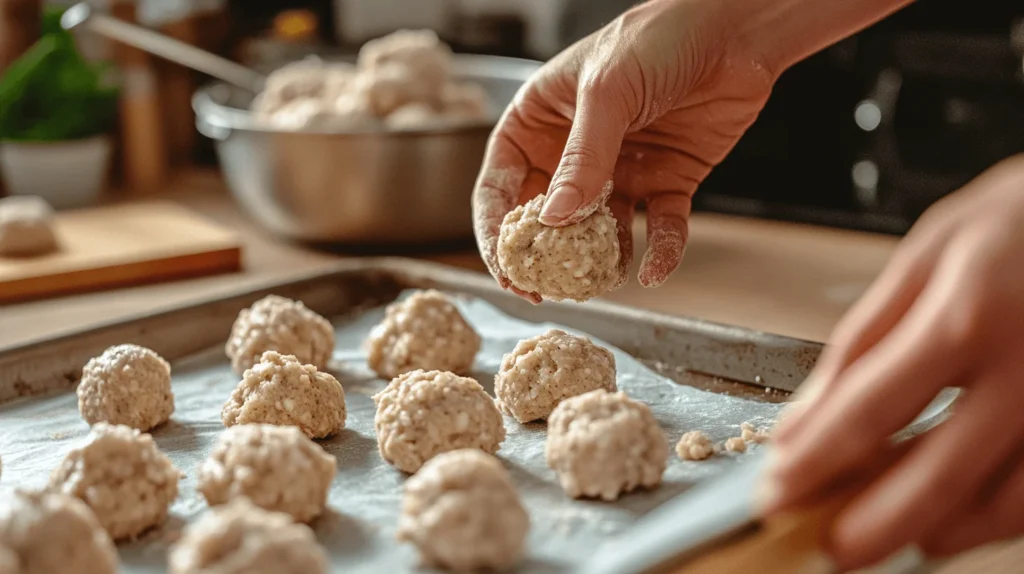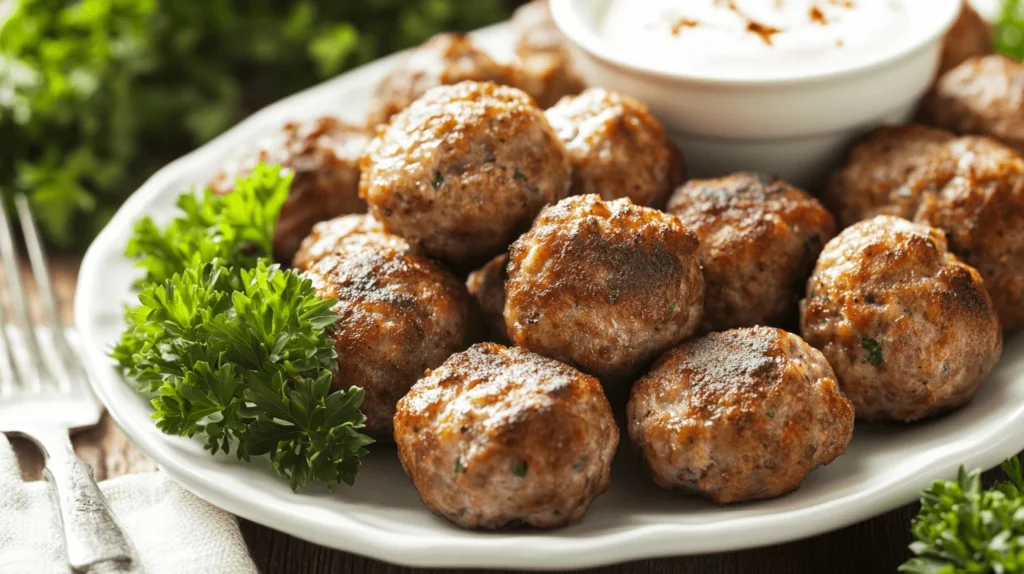If you’re craving a savory, bite-sized treat for a party or family gathering, sausage balls are always a popular choice. But traditional recipes often call for Bisquick as a shortcut to bind the ingredients together. However, making sausage balls without Bisquick can offer a unique twist on this classic dish. By exploring various alternatives to Bisquick, you can create a homemade, customizable recipe that delivers all the flavor without the need for a pre-made baking mix. In this guide, we’ll break down the essential ingredients, step-by-step instructions, and a few variations to try, so you can enjoy a delicious batch of sausage balls without Bisquick recipe at your next event.
What Are Sausage Balls?
Skipping Bisquick in your sausage ball recipe provides several benefits. First, you can gain better control over your ingredients to meet dietary restrictions, such as choosing gluten-free flour or low-carb options. Second, making sausage balls without a pre-made mix offers an authentic, from-scratch flavor. Lastly, this approach lets you customize your spice and seasoning blend, much like you would when preparing other homemade dishes with personal flair.
Why Skip Bisquick?
While Bisquick is a convenient and popular choice for many cooks, there are several reasons you might want to skip it in your sausage balls recipe. Sausage balls without Bisquick recipe is one of the key considerations when making this dish, as it allows for more control over the ingredients, especially when considering dietary restrictions or preferences. You might prefer to use gluten-free flour or healthier alternatives to reduce calories or carbs. Additionally, making the recipe from scratch can result in a more flavorful and personalized dish that doesn’t rely on store-bought mixes. Finally, skipping Bisquick means you can enjoy a more authentic flavor and texture in your sausage balls.
Essential Ingredients for Sausage Balls Without Bisquick Recipe
To make delicious sausage balls without Bisquick, you’ll need a few key ingredients that serve as the foundation for this flavorful dish. These ingredients are simple yet versatile, allowing you to customize the sausage balls to your taste.

Sausage: The Heart of the Recipe
The sausage is the main ingredient in sausage balls, and it’s essential to choose a good quality sausage for the best flavor. You can use any type of sausage, whether mild, spicy, or hot, depending on your preferences. For a lighter option, you might consider using turkey or chicken sausage. The fat content in the sausage is important, as it helps keep the sausage balls moist. When choosing sausage, look for one with plenty of seasoning or consider adding your own spices to adjust the flavor. For a delicious twist, try a sausage balls without Bisquick recipe, allowing for even more customization in flavor and texture.
Cheese: A Key Ingredient for Flavor and Texture
Cheese plays a crucial role in sausage balls, adding both flavor and texture. Sharp cheddar cheese is the most commonly used, as its bold flavor complements the sausage well. However, you can experiment with different types of cheese, such as mozzarella for a milder taste, or a combination of cheeses to create a more complex flavor profile. The cheese also helps bind the sausage and flour together, contributing to a more cohesive and flavorful ball. Cheese plays a binding role while adding richness, much like the secret behind enhancing texture in other baked dishes.
Flour Alternatives to Bisquick: A Gluten-Free Option
One of the main reasons to skip Bisquick in your sausage balls is to create a gluten-free version of the dish. You can use a variety of flour alternatives such as almond flour, coconut flour, or gluten-free all-purpose flour. These alternatives provide the necessary structure to hold the sausage balls together without relying on wheat flour or Bisquick. Each flour type may slightly alter the texture of the sausage balls, so it’s important to choose the right one based on your dietary preferences and the texture you want.
For a sausage balls without Bisquick recipe, simply mix your chosen flour alternative with sausage, cheese, and spices, then bake until golden brown for a delicious treat that fits your dietary needs.
Seasonings and Spices for Flavor Depth
The right seasonings and spices are essential for making flavorful sausage balls without Bisquick recipe. Classic spices such as garlic powder, onion powder, black pepper, and paprika can be used to bring out the richness of the sausage. You can also add fresh herbs like parsley or thyme for an additional layer of flavor. Some people like to include a bit of hot sauce or cayenne pepper for a spicy kick. The beauty of making sausage balls from scratch is that you can tailor the spice blend to your liking, whether you prefer a milder or more robust flavor.
Step-by-Step Guide to Making Sausage Balls Without Bisquick Recipe
Now that you have all the necessary ingredients, it’s time to walk through the process of making sausage balls without Bisquick. This section will break down the steps, offering helpful tips for achieving the perfect texture and flavor.

Preparing the Sausage Meat
Start by choosing your sausage and removing it from the casing if needed. Place the sausage in a large mixing bowl. You can use a fork or your hands to break it up into smaller pieces. If you are using a leaner sausage like turkey, you may want to add a bit of olive oil to ensure the mixture stays moist. If you like a spicier flavor, consider adding crushed red pepper flakes or a bit of hot sauce at this stage to enhance the flavor profile. Once your sausage is prepared, you can proceed to mix in your chosen seasonings and spices, such as garlic powder, onion powder, and paprika, to create delicious sausage balls without Bisquick.
Mixing the Ingredients: Tips for the Best Texture
After preparing the sausage, it’s time to add the cheese, flour alternative, and seasonings. Gradually add the cheese and flour, stirring continuously to incorporate. Be sure not to overmix the dough, as this can lead to tough sausage balls. You want to mix just enough for everything to be evenly distributed but not so much that the texture becomes dense. It’s best to use your hands to ensure that all ingredients are fully combined.
Shaping the Sausage Balls Properly
Once your ingredients are well mixed, it’s time to shape the sausage balls. Use your hands to form small, uniform balls—about 1 inch in diameter. If the dough is too sticky, you can lightly flour your hands or coat them with a bit of olive oil to make shaping easier. Make sure each sausage ball is roughly the same size to ensure even baking. If you’re feeling creative, you can shape them into different sizes or even use mini muffin tins to help them hold their shape.
Baking the Sausage Balls to Perfection
Preheat your oven to 375°F (190°C) and place the sausage balls on a baking sheet lined with parchment paper or a silicone baking mat. Bake the sausage balls for about 15 to 20 minutes, or until they are golden brown and cooked through. If you prefer crispier sausage balls, you can bake them for an additional 5 minutes. Keep an eye on them to prevent overcooking. After baking, allow the sausage balls to cool slightly before serving. These simple steps can be applied to many recipes, similar to techniques found in mastering versatile snacks.
Common Mistakes to Avoid in Sausage Balls Without Bisquick Recipe
While making sausage balls without Bisquick can be simple, there are a few common mistakes that can affect the final result. Avoid these errors to ensure your sausage balls turn out just right.
Using Too Much or Too Little Flour
The right balance of flour is crucial for the texture of your sausage balls. Too much flour can make them dry, while too little will make them fall apart. It’s important to use the correct amount of flour or flour alternative to create a cohesive mixture without overpowering the sausage flavor. A good rule of thumb is to start with 1 cup of flour per pound of sausage and adjust based on the consistency.
Overmixing the Dough: Why It’s a Problem
Overmixing the sausage ball mixture can lead to tough sausage balls. It’s tempting to mix everything thoroughly, but it’s important to stop as soon as the ingredients are incorporated. Overmixing activates the gluten in the flour, which can make the sausage balls dense and chewy instead of tender and flaky.
Not Baking Long Enough
Sausage balls need to be cooked long enough to ensure that the meat is fully cooked through and that the outside becomes golden and crisp. If you underbake them, the sausage balls may remain too soft or undercooked. Always check the internal temperature to make sure they reach at least 165°F (74°C) before serving.
Variations of Sausage Balls Without Bisquick Recipe
One of the benefits of making sausage balls from scratch is that you can experiment with various ingredients to create different flavors. Here are a few variations to try:
Adding Vegetables to the Sausage Balls
Incorporating vegetables into your sausage balls can add both flavor and nutrition. Chopped onions, bell peppers, spinach, or even shredded carrots can be mixed into the sausage mixture. These vegetables add a burst of color and fresh flavor, making your sausage balls more wholesome and satisfying.
Experimenting with Different Cheeses
While cheddar cheese is the classic choice, feel free to experiment with different types of cheese. Mozzarella, pepper jack, or even cream cheese can offer a unique twist on the traditional recipe. Mixing two or more types of cheese can also create a more complex flavor.
Spicy Sausage Balls: Perfect for Heat Lovers
If you love a little spice, consider adding ingredients like jalapeños, cayenne pepper, or hot sausage to your sausage balls. These spicy additions will give your sausage balls a fiery kick, perfect for heat lovers.
How to Serve Sausage Balls Without Bisquick Recipe
Once your sausage balls are baked to perfection, it’s time to serve them. Here’s how to make the most of your delicious creation.
Perfect Pairings for Sausage Balls
Sausage balls without Bisquick are versatile and pair well with a variety of sides. Serve them with a tangy dipping sauce, such as honey mustard or barbecue sauce, for added flavor. They also go well with fresh salads, roasted vegetables, or a classic potato dish. For a more indulgent meal, you can serve them alongside mashed potatoes or macaroni and cheese.
Ideal Serving Size and Storage Tips
Sausage balls are best served warm and fresh out of the oven, but they can be stored for later use. Allow the sausage balls to cool completely before storing them in an airtight container in the refrigerator. They can be kept for up to 3 days and reheated in the oven or microwave. For longer storage, sausage balls can be frozen for up to 3 months.
Healthier Alternatives in Sausage Balls Without Bisquick Recipe
If you’re looking to make your sausage balls a bit healthier, there are a few simple swaps you can make.
Using Leaner Meats in the Recipe
Swap traditional pork sausage for leaner options like turkey or chicken sausage to lower the fat content. These leaner meats still provide the flavor of sausage but with fewer calories. Just ensure that the sausage you use has enough fat to keep the sausage balls moist.
Lowering the Cheese Content: A Healthier Twist
To make your sausage balls healthier, you can reduce the amount of cheese or opt for a lower-fat version. This will help lower the calorie count without sacrificing too much flavor. Experiment with different cheese types to find the perfect balance between taste and healthiness.
How to Make Sausage Balls Without Bisquick for Special Diets
If you or your guests follow a specific diet, you can easily customize the sausage ball recipe to suit different dietary needs.
Gluten-Free Sausage Balls: What You Need to Know
To make gluten-free sausage balls, simply swap the regular flour for a gluten-free alternative like almond flour or coconut flour. Be sure to check that all other ingredients, such as the sausage and cheese, are gluten-free as well. Gluten-free sausage balls can be just as delicious as the original.
Keto-Friendly Sausage Balls: A Low-Carb Alternative
For a keto-friendly version, use almond flour or another low-carb flour substitute in place of regular flour. This will keep the carb count low while maintaining the savory taste of the sausage and cheese. Additionally, make sure to choose a sausage with minimal added sugar and carbs.
Dairy-Free Sausage Balls: Enjoy the Flavor Without the Dairy
If you’re following a dairy-free diet, you can replace the cheese with dairy-free cheese alternatives. Look for plant-based cheeses that melt well and complement the flavor of the sausage. You can also use a dairy-free milk alternative to help bind the mixture together.

FAQs About Sausage Balls Without Bisquick Recipe
Can I Make Sausage Balls Without Bisquick Ahead of Time?
Yes, you can make sausage balls ahead of time. Prepare the sausage mixture, shape the balls, and store them in the refrigerator for up to 24 hours before baking. Alternatively, you can freeze them and bake them later when needed.
How Do I Make Sausage Balls Without Bisquick More Flavorful?
To make your sausage balls more flavorful, experiment with different spices and seasonings. Adding herbs, garlic, or even a splash of hot sauce can enhance the flavor. You can also try different types of cheese or sausage to add variety.
What Can I Use Instead of Bisquick in the Recipe?
Instead of Bisquick, you can use regular flour, gluten-free flour, almond flour, or even breadcrumbs to help bind the sausage and cheese together. The key is to find a flour that provides the right texture for the sausage balls.
Can I Freeze Sausage Balls Without Bisquick?
Yes, you can freeze sausage balls without Bisquick. Once baked and cooled, store the sausage balls in an airtight container or freezer bag. They can be frozen for up to 3 months. To reheat, bake them in the oven at 350°F for 10 to 15 minutes.
How Long Should I Bake Sausage Balls Without Bisquick?
Bake sausage balls at 375°F for 15 to 20 minutes, or until they are golden brown and fully cooked. If you’re unsure, use a meat thermometer to ensure the internal temperature reaches 165°F.
How Can I Make Sausage Balls Without Bisquick Crispy?
To make sausage balls crispy, bake them longer or place them under the broiler for a few minutes at the end of baking. Keep a close eye on them to avoid burning.
Conclusion
Sausage balls without Bisquick offer a delicious and customizable alternative to the traditional recipe. By using fresh ingredients and experimenting with flavors, you can create a savory treat that suits your dietary needs and preferences. Whether you’re looking for a gluten-free, keto, or dairy-free version, there are plenty of options to explore. With the right ingredients, simple techniques, and a bit of creativity, you can enjoy sausage balls without Bisquick that are flavorful, satisfying, and perfect for any occasion.

